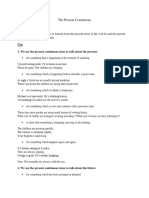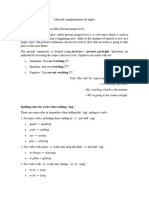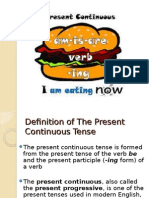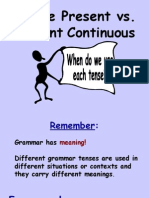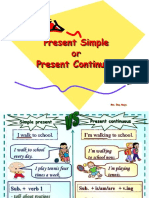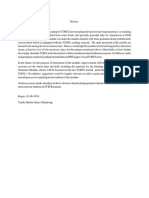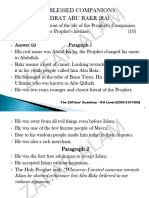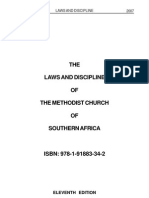Present Continous: USE 1. We Use The Present Continuous Tense To Talk About The Present
Present Continous: USE 1. We Use The Present Continuous Tense To Talk About The Present
Uploaded by
JonathanBautistaCopyright:
Available Formats
Present Continous: USE 1. We Use The Present Continuous Tense To Talk About The Present
Present Continous: USE 1. We Use The Present Continuous Tense To Talk About The Present
Uploaded by
JonathanBautistaOriginal Description:
Original Title
Copyright
Available Formats
Share this document
Did you find this document useful?
Is this content inappropriate?
Copyright:
Available Formats
Present Continous: USE 1. We Use The Present Continuous Tense To Talk About The Present
Present Continous: USE 1. We Use The Present Continuous Tense To Talk About The Present
Uploaded by
JonathanBautistaCopyright:
Available Formats
PRESENT CONTINOUS
USE
1. We use the present continuous tense to talk about the present:
for something that is happening at the moment of speaking:
Im just leaving work. Ill be home in an hour.
Please be quiet. The children are sleeping.
for something which is happening before and after a given time:
At eight oclock we are usually having breakfast.
When I get home the children are doing their homework.
for something which we think is temporary:
Michael is at university. Hes studying history.
Im working in London for the next two weeks.
for something which is new and contrasts with a previous state:
These days most people are using email instead of writing letters.
What sort of clothes are teenagers wearing nowadays? What sort of
music are they listening to?
to show that something is changing, growing or developing:
The children are growing quickly.
The climate is changing rapidly.
Your English is improving.
for something which happens again and again:
Its always raining in London.
They are always arguing.
George is great. Hes always laughing.
Note: We normally use always with this use.
2. We use the present continuous tense to talk about the future:
The next use is for definite future arrangements (with a future time word). In this
case we have already made a plan and we are pretty sure that the event will happen in
the future.
Mary is going to a new school next term.
What are you doing next week?
I'm meeting my father tomorrow.
We're going to the beach at the weekend.
I'm leaving at three.
STRUCTURE
1. Affirmative Sentences
SUB + AUX VERB (to be) + VERB+ING.
Examples:
Im talking.
Hes eating.
Theyre learning.
2. Negative Sentences
SUB + AUX VERB (to be) + NOT + VERB+ING.
Examples:
Im not talking.
Hes not [He isnt] eating.
3. Interrogative Sentences
AUX VERB (to be) + SUB + VERB+ING?
Examples:
Are you talking?
Is he eating?
Are they learning?
ADVERB PLACEMENT
The examples below show the placement for grammar adverbs such as: always, only,
never, ever, still, just, etc.
Examples:
You are still watching TV.
Are you still watching TV?
EXERCISES
Put the verb in brackets in the correct form to make different form of the Present
Continuous Tense.
1. John (read) a book now.
2. What (you do) tonight?
3. Jack and Peter (work) late today.
4. Silvia (not listen) to music.
5. Maria (sit) next to Paul.
6. How many other students (you study) with?
7. The phone (not ring).
2. Put the words in the correct order.
1. (he / walk to school now)
__________________________________________________________
2. (they/work/now)
__________________________________________________________
3. (you/not/walk)
__________________________________________________________
4. (they/learn new things)
__________________________________________________________
5. (when/he/start work)
__________________________________________________________
6. (why/I/stay at home)
__________________________________________________________
7. (we/not/win)
__________________________________________________________
8. (they/not/bring a cake)
__________________________________________________________
9. (the/dog/not/play with a ball)
__________________________________________________________
10. (where/you/work)
__________________________________________________________
You might also like
- MarshallDocument289 pagesMarshallJoão Pedro AguinskyNo ratings yet
- Chapter Ii Present Continous TenseDocument25 pagesChapter Ii Present Continous TenseAisyah AminyMarwanNo ratings yet
- The Present ContinuousDocument3 pagesThe Present ContinuousGeorgeNo ratings yet
- Material Complementario de Inglés (Clase 21.05)Document9 pagesMaterial Complementario de Inglés (Clase 21.05)Alec MonteroNo ratings yet
- Present Continuous TenseDocument24 pagesPresent Continuous TenseMuhammad Zaky JundanaNo ratings yet
- CSPP Grade 11 Grammar Simple Present and Present ContinuousDocument1 pageCSPP Grade 11 Grammar Simple Present and Present ContinuousElena TopNo ratings yet
- Present Perfect Vs Present Perfect ContinuousDocument14 pagesPresent Perfect Vs Present Perfect ContinuousInes CardosoNo ratings yet
- Present TensesDocument8 pagesPresent Tensesyaseen10388No ratings yet
- Independent Work: ThemeDocument12 pagesIndependent Work: ThemeHacer BullaNo ratings yet
- Present Continuous Tense: ExamplesDocument6 pagesPresent Continuous Tense: ExamplesKireiNo ratings yet
- Present Continuous TenseDocument5 pagesPresent Continuous TensephuongNo ratings yet
- Differences Between Simple Present and Present Continuous.Document7 pagesDifferences Between Simple Present and Present Continuous.PedroNo ratings yet
- Simple Present Vs Present ContinuousDocument23 pagesSimple Present Vs Present ContinuousAsad RzayevNo ratings yet
- Progressive TensesDocument7 pagesProgressive TensesAinin SofiaNo ratings yet
- Present Continuous: I Am +V - Ing He, She, It Is +V - Ing We, They, You Are +V - IngDocument2 pagesPresent Continuous: I Am +V - Ing He, She, It Is +V - Ing We, They, You Are +V - IngCông TuấnNo ratings yet
- Present Simple Vs Present ContinuousDocument27 pagesPresent Simple Vs Present Continuous4mcvbs795mNo ratings yet
- Present Tense - Reading MaterialDocument14 pagesPresent Tense - Reading MaterialMs Chikoti Sai Vaishnavi IPENo ratings yet
- The Present Continuous Tense: Performed by Joni Wijayanto and Wanda Pandu WiditirtoDocument34 pagesThe Present Continuous Tense: Performed by Joni Wijayanto and Wanda Pandu WiditirtoJoniNo ratings yet
- 145080Document23 pages145080maraguti3100% (1)
- My Daily RoutineDocument44 pagesMy Daily RoutineLia VizuetaNo ratings yet
- Class 3 Present ContinuousDocument8 pagesClass 3 Present ContinuousCristina SaraNo ratings yet
- Simple Present vs. Present ContinuousDocument23 pagesSimple Present vs. Present Continuousvictor castañoNo ratings yet
- Scan Barcode Page 73Document5 pagesScan Barcode Page 73biancaNo ratings yet
- A1-pages-4Document20 pagesA1-pages-4w8jwpsrfsgNo ratings yet
- Present Simple Vs Present ContinuousDocument2 pagesPresent Simple Vs Present ContinuousSerpin AlpiniNo ratings yet
- English Tenses (Updated 2021)Document17 pagesEnglish Tenses (Updated 2021)Sam SodawinNo ratings yet
- Eng-Thursday-Friday 3-5h-Alexandra-Pres - Continuous, Blogs, KahootDocument19 pagesEng-Thursday-Friday 3-5h-Alexandra-Pres - Continuous, Blogs, KahootAlexandra CarvajalNo ratings yet
- How Do We Make The Simple Present Tense?Document8 pagesHow Do We Make The Simple Present Tense?Syazwan ZentNo ratings yet
- Trayectoria 3er año Inglés.Document8 pagesTrayectoria 3er año Inglés.Manjiro愛 SanoNo ratings yet
- Present Tense VS Present ContinuousDocument4 pagesPresent Tense VS Present ContinuousRahma Ben KhalifaNo ratings yet
- Simple Present & Present ProgressiveDocument11 pagesSimple Present & Present ProgressiveBaby PuddingNo ratings yet
- B2 Present Continuous Tense GrammarDocument2 pagesB2 Present Continuous Tense GrammarnogaraNo ratings yet
- Present Continuous TeoriaDocument2 pagesPresent Continuous TeoriachanrockyNo ratings yet
- Unit 5 Upc 04 What Are You WatchingDocument12 pagesUnit 5 Upc 04 What Are You WatchingJULIAN ALEXANDER SANTOS MONTERONo ratings yet
- Modul Bahasa Inggris Umum Akper NgawiDocument21 pagesModul Bahasa Inggris Umum Akper NgawiElfinNa'imatulKhafidhohNo ratings yet
- Present Continuo3grupDocument10 pagesPresent Continuo3grupSulleyman AmadeNo ratings yet
- Present Simple Versus Present ProgressiveDocument13 pagesPresent Simple Versus Present Progressivejosuemora177No ratings yet
- Oxford English PresentationsDocument9 pagesOxford English PresentationsLamin Bt SanyangNo ratings yet
- ch2 TensesDocument10 pagesch2 Tenses車子No ratings yet
- Simple Present vs. Present ContinuousDocument20 pagesSimple Present vs. Present ContinuousDian AgustinaNo ratings yet
- Present Simple and ContinuousDocument5 pagesPresent Simple and ContinuousCarmenNo ratings yet
- English Present TensesDocument8 pagesEnglish Present TensesAreFrayNo ratings yet
- English 5.8Document25 pagesEnglish 5.8rossana ronda100% (1)
- The Present Continous TenseDocument3 pagesThe Present Continous TenseBRIYITH SIRLEY ROJAS TOBARNo ratings yet
- Simple Present Vs Present ContinuousDocument21 pagesSimple Present Vs Present ContinuousArevaloandrees75% (4)
- Unit 1 Making Connections BE1 Part 1Document32 pagesUnit 1 Making Connections BE1 Part 1Durga Sri100% (1)
- Topic 1 Simple Present Vs ContinuousDocument31 pagesTopic 1 Simple Present Vs ContinuousMargie ChavezNo ratings yet
- LA1 Present Simple & Present Continuous INPUTDocument6 pagesLA1 Present Simple & Present Continuous INPUTtalhacyln52No ratings yet
- Bahasa Inggris Kel.3 PDFDocument9 pagesBahasa Inggris Kel.3 PDFcicisutinah94No ratings yet
- Present Simple Vs Present ContinuousDocument24 pagesPresent Simple Vs Present ContinuousnmabroukNo ratings yet
- English Tenses IIDocument17 pagesEnglish Tenses IIEdwin CfracoNo ratings yet
- Lab Bhs Inggris 1 (Grammar and Speaking)Document42 pagesLab Bhs Inggris 1 (Grammar and Speaking)aphroditeNo ratings yet
- Present ContinuousDocument7 pagesPresent ContinuousSantana Bazán Elim MicheletNo ratings yet
- Present Continuous.: How Do We Make The Present Continuous Tense?Document11 pagesPresent Continuous.: How Do We Make The Present Continuous Tense?RANDY NAYID PADILLA BELENONo ratings yet
- Present ContinuousDocument15 pagesPresent Continuousnarinnariin874No ratings yet
- Present Continuous Explanation (2)Document2 pagesPresent Continuous Explanation (2)Miriam CNo ratings yet
- Taller Once Ingles FuturoDocument6 pagesTaller Once Ingles FuturoMarianita Soriano VargasNo ratings yet
- Apuntes Ingles b2Document25 pagesApuntes Ingles b2Arancha ManeiroNo ratings yet
- Topik: Present Continuous FormsDocument4 pagesTopik: Present Continuous FormsEurusNo ratings yet
- English Verb Tenses: Practice and Speak Like a NativeFrom EverandEnglish Verb Tenses: Practice and Speak Like a NativeRating: 5 out of 5 stars5/5 (1)
- Please Write Down:: ExerciseDocument1 pagePlease Write Down:: ExerciseJonathanBautistaNo ratings yet
- Short Tall FATDocument6 pagesShort Tall FATJonathanBautistaNo ratings yet
- Indice 2004Document28 pagesIndice 2004JonathanBautistaNo ratings yet
- The DetectiveDocument1 pageThe DetectiveJonathanBautistaNo ratings yet
- Justre+1211 TitlelisDocument884 pagesJustre+1211 TitlelisJonathanBautistaNo ratings yet
- Focus4 2E Cumulative Test 3 Units1-6 GroupBDocument6 pagesFocus4 2E Cumulative Test 3 Units1-6 GroupBAgata KowalczykNo ratings yet
- Joins and Cardinality Rmcug May 2013 PresentationDocument20 pagesJoins and Cardinality Rmcug May 2013 PresentationAmit RaiNo ratings yet
- Discrete Mathematics LatticesDocument11 pagesDiscrete Mathematics Latticeslenovoiris3No ratings yet
- Intro To Triad PairsDocument2 pagesIntro To Triad PairsCezanne Garcia100% (4)
- Sitefinity MVCDocument2 pagesSitefinity MVCsamiudheenNo ratings yet
- Ten Blessed CompanionsDocument27 pagesTen Blessed CompanionsMusa AliNo ratings yet
- CH 4-1Document31 pagesCH 4-1Humam Al-DhubhaniNo ratings yet
- Creating A Proxy REST API With IBM API Management 4.0.0.0Document23 pagesCreating A Proxy REST API With IBM API Management 4.0.0.0sreedharshastryNo ratings yet
- Law DiscipleDocument240 pagesLaw DisciplequabekazaNo ratings yet
- Sandigan Song Chart Victory WorshipDocument1 pageSandigan Song Chart Victory Worshipjohn arambuyongNo ratings yet
- Premise Indicator Conclusion IndicatorDocument4 pagesPremise Indicator Conclusion Indicatoraditya24292No ratings yet
- Untitled TeluguDocument1 pageUntitled TeluguAnonymous 9uu04elNo ratings yet
- Nursing Management LeadershipDocument8 pagesNursing Management LeadershipIvy Balza Caber100% (1)
- 1.initial Boot SequenceDocument94 pages1.initial Boot SequenceTommaso Mauro TautonicoNo ratings yet
- Egra Grade 2 Pre AssessmentDocument11 pagesEgra Grade 2 Pre AssessmentMlyn CrzNo ratings yet
- Style Manual: For Publications in The National InstituteDocument96 pagesStyle Manual: For Publications in The National InstituteAhmad BalarabeNo ratings yet
- I Complete The Following Sentences Using GOING To and The Verbs in BracketsDocument1 pageI Complete The Following Sentences Using GOING To and The Verbs in BracketsSandra AleksicNo ratings yet
- Lebanese International University School of Arts and Sciences - Department of Computer ScienceDocument6 pagesLebanese International University School of Arts and Sciences - Department of Computer ScienceAli NassarNo ratings yet
- Paul ClaudelDocument4 pagesPaul Claudelapi-357156106No ratings yet
- Catechist Letter of PermissionDocument3 pagesCatechist Letter of PermissionRose Angela Mislang UliganNo ratings yet
- Ref 47 PDFDocument6 pagesRef 47 PDFAli H. NumanNo ratings yet
- Factorization Unique and Otherwise 1st Edition Steven H. Weintraub all chapter instant downloadDocument82 pagesFactorization Unique and Otherwise 1st Edition Steven H. Weintraub all chapter instant downloadtakisehansz100% (1)
- PDF para Conclusion 5Document15 pagesPDF para Conclusion 5Macarena Poma SantillanNo ratings yet
- Kruskal-Wallis Test: and It'S Implementation in R ProgrammingDocument14 pagesKruskal-Wallis Test: and It'S Implementation in R Programmingsanjay patilNo ratings yet
- Computer Science Investigatory ProjectDocument15 pagesComputer Science Investigatory ProjectJayaditya Dey50% (2)
- Adop Issues - 1Document16 pagesAdop Issues - 1Praveen KumarNo ratings yet
- Oodj Test1Document4 pagesOodj Test1John WalkerNo ratings yet
- Lesson Plan PrepositionsDocument4 pagesLesson Plan Prepositionsapi-284467399No ratings yet
- Beethovens Conversation Books Volume 1 NDocument5 pagesBeethovens Conversation Books Volume 1 NRu1zNo ratings yet


